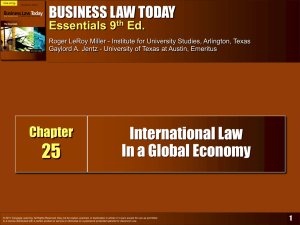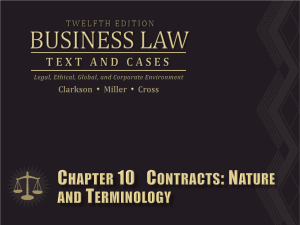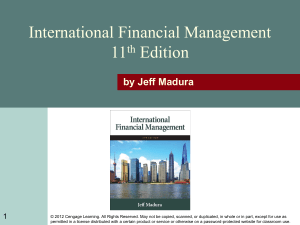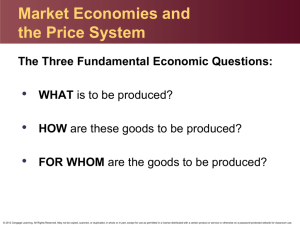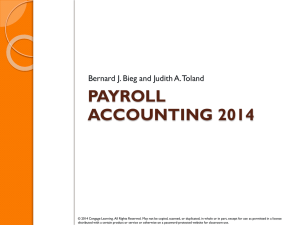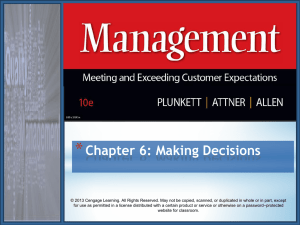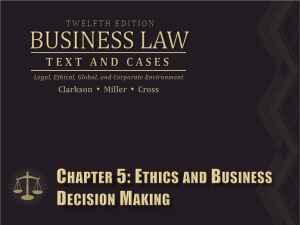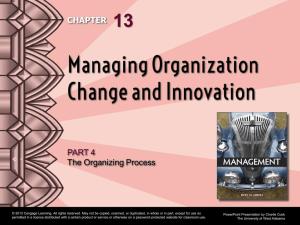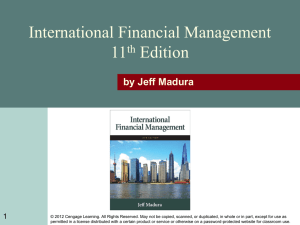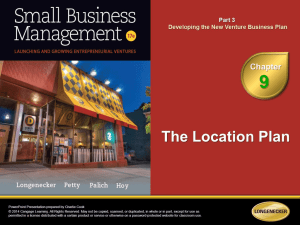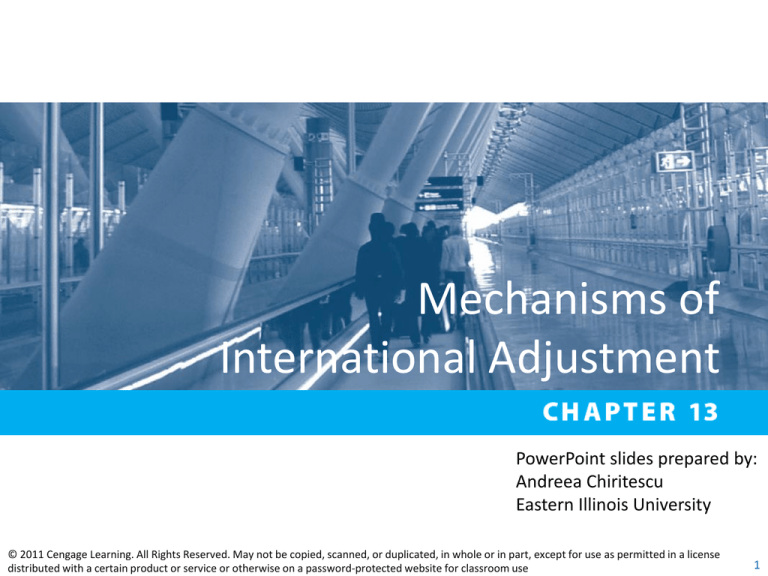
Mechanisms of
International Adjustment
PowerPoint slides prepared by:
Andreea Chiritescu
Eastern Illinois University
© 2011 Cengage Learning. All Rights Reserved. May not be copied, scanned, or duplicated, in whole or in part, except for use as permitted in a license
distributed with a certain product or service or otherwise on a password‐protected website for classroom use
1
Adjustment Mechanisms
• Adjustment mechanism
• Works for the return to equilibrium after the
initial equilibrium has been disrupted
• Current-account adjustment
• Automatic adjustment
• Discretionary government policies
• Automatic adjustment of the current-account
• Under a fixed exchange-rate system
• Adjustment variables: prices and income
© 2011 Cengage Learning. All Rights Reserved. May not be copied, scanned, or duplicated, in whole or in part, except for use as permitted in a license
distributed with a certain product or service or otherwise on a password‐protected website for classroom use
2
Price Adjustments
• Gold standard, late 1800s to early 1900s
• Conditions for each member nation
• Money supply = gold or paper money backed by
gold
• Official price of gold – defined in terms of national
currency
• Buy and sell gold at that price
• Free import and export of gold
• Money supply - directly tied to current account
© 2011 Cengage Learning. All Rights Reserved. May not be copied, scanned, or duplicated, in whole or in part, except for use as permitted in a license
distributed with a certain product or service or otherwise on a password‐protected website for classroom use
3
Price Adjustments
• Quantity theory of money
• Classical price-adjustment mechanism
• Equation of exchange: MV=PQ
• M – money supply
• V – velocity of money
• P - average price at which each of the final goods is
sold
• Q – physical volume of all final goods produced
© 2011 Cengage Learning. All Rights Reserved. May not be copied, scanned, or duplicated, in whole or in part, except for use as permitted in a license
distributed with a certain product or service or otherwise on a password‐protected website for classroom use
4
Price Adjustments
• MV=PQ identity
• Total monetary expenditures on final goods =
monetary value of the final goods sold
• Amount spent on final goods = amount
received from selling them
© 2011 Cengage Learning. All Rights Reserved. May not be copied, scanned, or duplicated, in whole or in part, except for use as permitted in a license
distributed with a certain product or service or otherwise on a password‐protected website for classroom use
5
Price Adjustments
• Classical economists
• Assumptions
• Q is fixed at the full employment level in the long
term
• V was constant
• A change in M must induce a direct and
proportionate change in P
© 2011 Cengage Learning. All Rights Reserved. May not be copied, scanned, or duplicated, in whole or in part, except for use as permitted in a license
distributed with a certain product or service or otherwise on a password‐protected website for classroom use
6
Price Adjustments
• Criticisms against the price-adjustment
mechanism
• Classical linkage between changes in a nation’s
gold supply and changes in its money supply no
longer holds
• Full employment – doesn’t always exist
• Prices and wages are inflexible in a downward
direction
• Stability and predictability of V - questioned
© 2011 Cengage Learning. All Rights Reserved. May not be copied, scanned, or duplicated, in whole or in part, except for use as permitted in a license
distributed with a certain product or service or otherwise on a password‐protected website for classroom use
7
Financial Flows and Interest-Rate
Differentials
• Factors affecting a nation’s capital and financial
account
• Interest-rate fluctuations in domestic and
foreign markets
• Investment profitability
• National tax policies
• Political stability
© 2011 Cengage Learning. All Rights Reserved. May not be copied, scanned, or duplicated, in whole or in part, except for use as permitted in a license
distributed with a certain product or service or otherwise on a password‐protected website for classroom use
8
FIGURE 13.1 Capital and financial account schedule for the U.S.
Interest-rate differentials between the United States and the rest of the world induce movements
along the U.S. capital and financial account schedule. Relatively high (low) U.S. interest rates trigger
net financial inflows (outflows) and an upward (downward) movement along the capital and
financial account schedule. The schedule shifts upward/downward in response to changes in
noninterest rate determinants such as investment profitability, tax policies, and political stability.
© 2011 Cengage Learning. All Rights Reserved. May not be copied, scanned, or duplicated, in whole or in part, except for use as permitted in a license
distributed with a certain product or service or otherwise on a password‐protected website for classroom use
9
Income Adjustments
• Income adjustment mechanism
• John Maynard Keynes, 1930s
• Focus on automatic changes in income to bring
about adjustment in a nation’s current account
• Under fixed exchange rates
• Influence of income changes in nations with
current-account surpluses and deficits would help
restore equilibrium automatically
© 2011 Cengage Learning. All Rights Reserved. May not be copied, scanned, or duplicated, in whole or in part, except for use as permitted in a license
distributed with a certain product or service or otherwise on a password‐protected website for classroom use
10
Income Adjustments
• Income adjustment mechanism
• Under fixed exchange rates
• Persistent current-account surplus
• Rising income - Increasing imports
• Current-account deficit
• Fall in income - Declining imports
• Effects of income changes on import levels will
reverse the disequilibrium in the current account
© 2011 Cengage Learning. All Rights Reserved. May not be copied, scanned, or duplicated, in whole or in part, except for use as permitted in a license
distributed with a certain product or service or otherwise on a password‐protected website for classroom use
11
Income Adjustments
• The foreign repercussion effect
• Income adjustment mechanism
• And include the impact that changes in
domestic expenditures and income levels have
on foreign economies
• Both the rise in income of the surplus nation
and the fall in income of the deficit nation are
dampened
© 2011 Cengage Learning. All Rights Reserved. May not be copied, scanned, or duplicated, in whole or in part, except for use as permitted in a license
distributed with a certain product or service or otherwise on a password‐protected website for classroom use
12
Income Adjustments
• Importance of the foreign repercussion effect
• Depends on the economic size of a country
• A small nation that increases its imports from a
large nation
• Little impact on the large nation’s income level
• Major trading nations
• Significant foreign repercussion effect
© 2011 Cengage Learning. All Rights Reserved. May not be copied, scanned, or duplicated, in whole or in part, except for use as permitted in a license
distributed with a certain product or service or otherwise on a password‐protected website for classroom use
13
Disadvantages of Automatic Adjustment
Mechanisms
• An efficient adjustment mechanism
• Requires central bankers to forgo their use of
monetary policy
• To promote the goal of full employment without
inflation
• Each nation must be willing to accept inflation
or recession
• When current-account adjustment requires it
© 2011 Cengage Learning. All Rights Reserved. May not be copied, scanned, or duplicated, in whole or in part, except for use as permitted in a license
distributed with a certain product or service or otherwise on a password‐protected website for classroom use
14
Monetary Adjustments
• Monetary approach to balance of payments
• Balance of payments - affected by
discrepancies between
• The amount of money people desire to hold
• The amount supplied by the central bank
• Excess demand for money - fulfilled by inflows
of money from another country
• Excess supply of money - eliminated by
outflows of money to another country
© 2011 Cengage Learning. All Rights Reserved. May not be copied, scanned, or duplicated, in whole or in part, except for use as permitted in a license
distributed with a certain product or service or otherwise on a password‐protected website for classroom use
15

